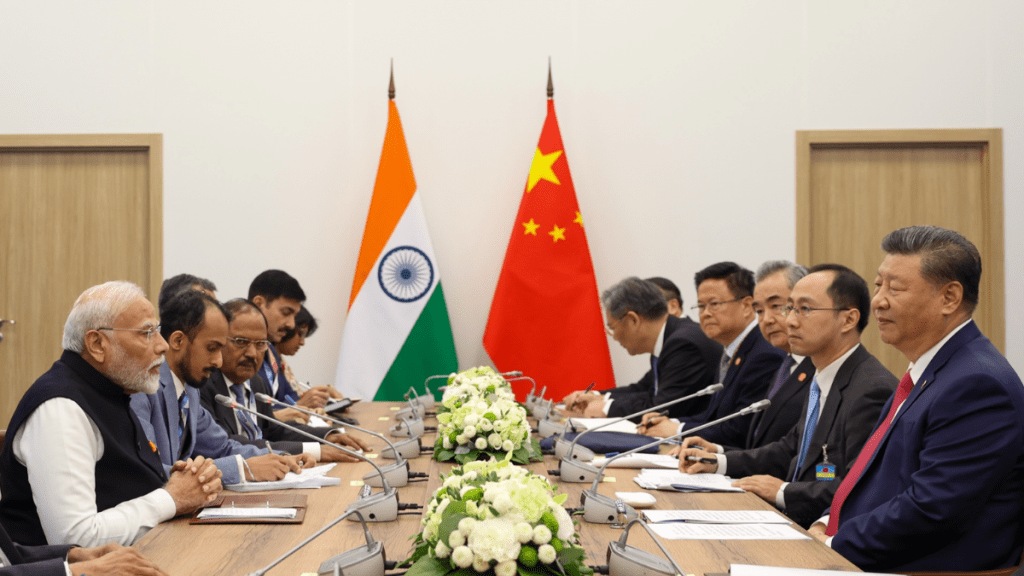The recent BRICS Summit in Kazan has marked a notable shift in the trajectory of India-China relations, with Prime Minister Narendra Modi and Chinese President Xi Jinping meeting on the sidelines to endorse a landmark agreement on border issues along the Line of Actual Control (LAC). The accord, primarily focused on disengagement and patrolling in eastern Ladakh, comes amid a backdrop of longstanding tension and unresolved border disputes between the two nations.
Russian Ambassador to India Denis Alipov praised the outcome, terming it a “positive development in bilateral ties” between India and China, signalling potential for enhanced stability in the region. “We wholeheartedly welcome the meeting,” Alipov stated, adding that the summit has underscored the importance of cooperation between these two key Eurasian powers.
India-China Meeting After Five Years: A Diplomatic Breakthrough
The Kazan meeting was the first in-person engagement between the leaders of India and China in five years. This encounter, while brief, held substantial diplomatic weight as it signalled both countries’ willingness to take concrete steps toward managing their differences. Alipov, responding to media queries, expressed optimism about this breakthrough, asserting that stable relations between India and China could foster regional security and facilitate economic progress across Eurasia.
“We welcomed and are happy that the first meeting of India and China leaders after five years took place,” Alipov noted. “The discussions in Kazan on border issues and bilateral cooperation mark a significant step forward.” Although Russia played no direct role in arranging the talks, Alipov emphasized the value Russia places on strengthened India-China relations, noting that these efforts are favourable not only for regional stability but for global dynamics as well.
BRICS Summit: An Inclusive Platform for Global South Cooperation
Beyond the India-China discussions, the BRICS Summit itself, hosted in Kazan, set a new precedent by expanding its format to include over 35 countries, highlighting the grouping’s commitment to fostering a multipolar world order. Ambassador Alipov reiterated that BRICS, which comprises Brazil, Russia, India, China, and South Africa, is not intended as an “anti-Western” alliance but rather as a platform that welcomes non-Western perspectives on global governance, economic development, and sustainability.
“BRICS is not anti-West but non-West,” Alipov clarified, stressing that its initiatives are geared towards creating a balanced global framework that includes emerging economies. Over 40 countries have expressed interest in joining BRICS, which, according to Alipov, underlines the attraction of the group’s inclusive approach.
Expansion of BRICS Initiatives and Partnerships
One of the summit’s most significant outcomes was the establishment of “partner states” within the BRICS framework, a move aimed at diversifying cooperation and engaging new countries without altering the core group. This shift is expected to “multiply value and diversify partnerships,” Alipov explained, responding to heightened interest in BRICS membership.
In line with the group’s vision for inclusive growth, the New Development Bank, an arm of BRICS, announced the approval of 100 projects, covering areas like cross-border payment systems, expanded currency arrangements, and measures aimed at mitigating current account deficits among members. Additionally, Alipov highlighted that the Kazan Declaration lays out ambitious plans in fields ranging from AI regulation to climate research, showcasing BRICS’ resolve to address contemporary global challenges.
BRICS’ Economic Strength and Vision for Global Reform
The Kazan summit also provided a platform for Alipov to underscore the economic clout of BRICS nations, which now represent 40% of global oil production and 30% of the world’s landmass. In contrast, he argued, groups like the G7 lack representation from some of the fastest-growing economies, and developing countries often face resistance within traditional global institutions.
In addressing recent geopolitical shifts, Alipov commented on the United States’ sanctions against Russia, cautioning that other BRICS nations, including China and potentially even India, could face similar measures in the future. “Right before the BRICS summit, the U.S. announced new unilateral sanctions against Russia. Today it is Russia; tomorrow it could be China, and possibly even India,” Alipov warned, pointing to a growing need for a united front among emerging economies.
BRICS’ emphasis on a multipolar world extends beyond economic cooperation, aiming to overhaul international systems to be more representative and less dominated by a few powers. “BRICS does not talk about anyone. We aim to reform,” Alipov asserted, articulating a vision that positions the group as a champion for global equity.
The Path Ahead: Balancing Cooperation and Competition
The dialogue between Modi and Xi in Kazan has injected a renewed sense of optimism into India-China relations, although challenges remain. With Alipov emphasizing that stable India-China relations benefit Eurasia and the broader international community, the meeting serves as a testament to the value of diplomatic engagement within multilateral settings.


